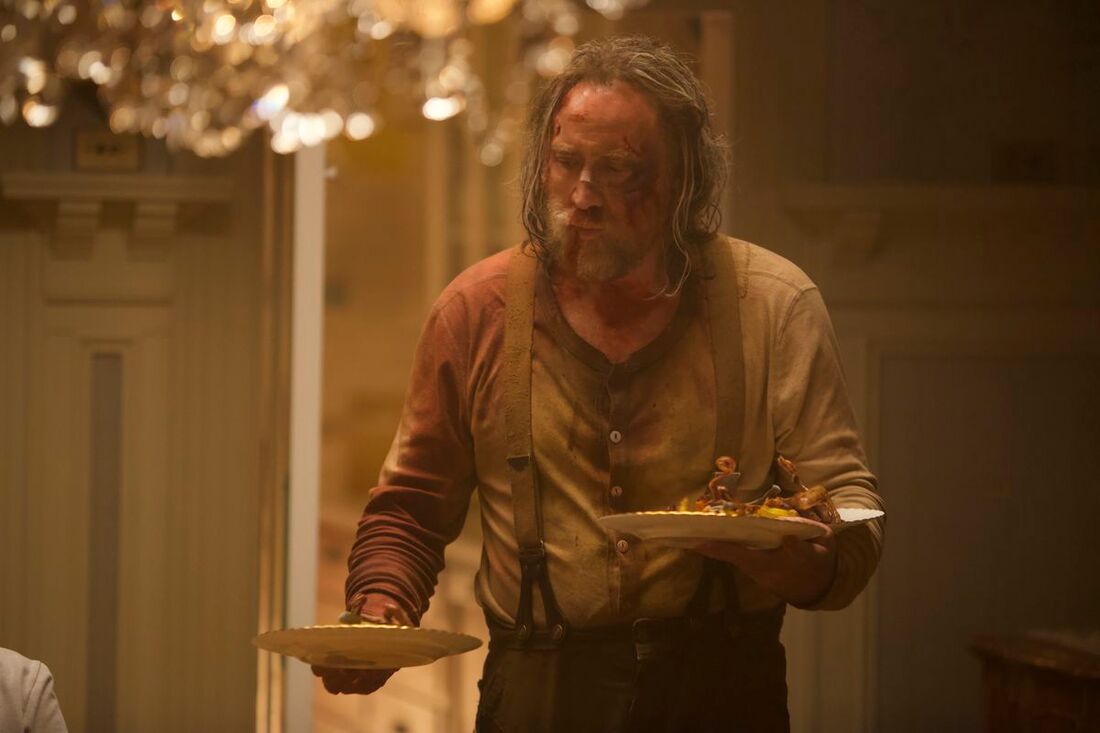Pig looks and sounds exactly like John Wick for a good chunk of its running time. A grieving man with a past has a beloved animal taken from him, and has to enter his old world to find it. Cage could absolutely make that kind of movie, if he hasn’t already, and his bearing and costuming in Pig suggests exactly that. Feld seems to be wearing all his clothes at the same time. Combined with a substantial beard and a refusal to wash the robbery-induced blood off his face, he’s an imposing man built to look like a girthy Unabomber. Sarnoski and co-writer Vanessa Block know exactly what they’re doing, dangling the eruption of violence over many scenes and pulling back from the edge. They understand that Cage’s presence and an opening act this evocative of John Wick primes the viewer to sit back and wait for what must happen, only to subvert those expectations over and over again. John Wick played this scenario in one franchise-building way. Sarnoski is less concerned with building an ever-expanding mythology than in drilling down into Feld’s mind and exploring the world he used to live in.
That world is one Amir moves freely in and Pig is finely attuned to what kind of environment would best suit a sports-car driving poseur who distills fine sensory experiences into trendiness and self-regard. Sarnoski filmed in Portland, and the city whose unofficial motto is Keep Portland Weird appears long dead through his eyes. What’s come in its place, if it ever existed at all, is the same kind of upper-class haute cuisine emptiness that can be found in any major city, where everything’s a gel or an emulsion on an undifferentiated tasting menu and the value of a place is found in telling people you’ve eaten there as opposed to the meal itself. The film’s best scene, which doubles as the Scene of the Year for 2021, finds Feld seated at the restaurant of a former employee (David Knell) in search of information. Feld wonders if this place, where people like Amir tell him the food is excellent without taking a bite, is what he wanted to do when he started out. It’s a raw dissection of a live subject and a perfect dismissal of the 1%’s cannibalism of passion and talent. Pig is largely about the refusal to appreciate something beautiful for its beauty as opposed to its usefulness or its resale value. The denizens of the chef’s restaurant would believe beauty only exists if the price is right, a mindset that partly sent Feld from the heights of his city’s food scene to the forest.
Primarily, however, Feld’s exile is the result of grief over his wife’s death, an emotion that Amir can also relate to. While the film dismisses most everything about his life and his aesthetic, Sarnoski saves some amount of sympathy for Amir. Played with thin bravado and a deeper sensitivity by Wolff, Amir’s pairing with Feld begins as an odd-couple relationship before they find common ground over deceased loved ones. Amir’s been motherless for years, raised by a harsh father (Adam Arkin) who’s also in the luxury wholesaling business. When faced with the loss of a mother or wife, a reasonable outcome when confronted with what can be taken away from a person is to do exactly what one wants to do, to not live by someone else’s leave, slogging away at unfulfilling work. This is essentially what Feld tells his former colleague and it’s why Amir’s emptiness requires little prodding to show itself. Things fade, entropy is unavoidable. Why waste the intervening time as a being without will?
A film that features as much food as this one needs to have a connection to sensuality, and Sarnoski did his homework with movies like Big Night or Ratatouille. Each of the three acts are titled after a prepared dish, and the film takes time to watch the cooking and the eating of each one. Actors, both human and animal, convey what the dish tastes and smells like. Outside of food, Pig has a palpable care with sensory details. The hair on Feld’s pig is lovingly observed, as is the cold of a basement floor that Feld has to pick himself off of. When Feld exchanges one cookie at a bakery for another, seemingly identical one, he makes the viewer believe that he made the right choice. Even Feld himself leaps off the screen as a person who is smelled before he’s seen. Cage’s achievement here is looking the way he does and still projecting the dignity of a person people are desperate to impress, even in this supposedly fallen state.
I’d like to one day have a pricey omakase dinner, but when I think about the likely price tag, I’m then prompted to wonder if it’s that much better than the delicious $15 chirashi at a local sushi joint attached to a seafood boil eatery. They’re not working hard at the cheaper place, without the same passion or satisfaction in their food? I can’t instead practice my own skills at home and make a delicious piece of fish for myself or my friends, taking comfort in the fact that I worked to feed them? Aren’t absurdly expensive meals another outlet for the obvious and obscene surplus of wealth in the economy, where rich morons compare their Bored Ape NFT’s over $150 steaks? Pig might lack for violence, but it’s a furious film that has anger at joy thieves, whether they be plutocrats or death itself. With Pig, Sarnoski and Cage push back against them by creating their own font of joy. A

 RSS Feed
RSS Feed